SOURCE:
( ) Iran Update, December 3, 2023: https://www.understandingwar.org/backgrounder/iran-update-december-3-2023
( ) ENVIRON BATTLE FIELD GAZA as on DEC 3, 2023: https://youtu.be/mLPjlFwrarI
ENVIRON BATTLE FIELD GAZA
as on DEC 3, 2023:
THIS IS NOT OIL or GAS IT IS DEEP STATE
Iran Update, December 3, 2023
Brian Carter, Nicholas Carl, Andie Parry, Ashka Jhaveri, and Amin Soltani
Information Cutoff: 5:00 pm EST
The Iran Update provides insights into Iranian and Iranian-sponsored activities abroad that undermine regional stability and threaten US forces and interests. It also covers events and trends that affect the stability and decision-making of the Iranian regime. The Critical Threats Project (CTP) at the American Enterprise Institute and the Institute for the Study of War (ISW) provides these updates regularly based on regional events. For more on developments in Iran and the region, see our interactive map of Iran and the Middle East.
Note: CTP and ISW have refocused the update to cover the Israel-Hamas war. The new sections address developments in the Gaza Strip, the West Bank, Lebanon, and Syria, as well as noteworthy activity from Iran’s Axis of Resistance. We do not report in detail on war crimes because these activities are well-covered in Western media and do not directly affect the military operations we are assessing and forecasting. We utterly condemn violations of the laws of armed conflict and the Geneva Conventions and crimes against humanity even though we do not describe them in these reports.
Click here to see CTP and ISW’s interactive map of Israeli ground operations. This map is updated daily alongside the static maps present in this report.
Key Takeaways:
- Hamas has used increasingly sophisticated tactics against Israeli forces in the Gaza Strip since the humanitarian pause ended on December 1.
- Iran and its so-called “Axis of Resistance” are exploiting the Israel-Hamas war to support their objective of expelling US forces from the Middle East.
- The Houthi movement likely attacked three commercial vessels and possibly a US Navy vessel around the Bab al Mandeb.
- Israeli forces began ground operations into the southern Gaza Strip. Palestinian militias targeted Israeli forces along Israeli lines of advance in the southern Gaza Strip using direct and indirect fire.
- The IDF Arabic-language spokesperson posted specific evacuation orders covering areas of Khan Younis.
- Israel recalled its negotiators from Qatar after reaching a “dead end” in ceasefire talks.
- Palestinian militias in the Gaza Strip conducted 21 rocket attacks into Israel.
- Palestinian fighters clashed with Israeli forces in seven towns across the West Bank.
- Lebanese Hezbollah claimed seven attacks into northern Israel, targeting Israeli forces, including one attack that wounded 11 Israeli soldiers and civilians.
- The Islamic Resistance in Iraq resumed its attacks on US forces after the humanitarian pause in the Gaza Strip ended on December 1. The Islamic Resistance in Iraq said that five of its fighters died in battle.
- The two IRGC general officers killed in Israeli airstrikes in Syria on December 2 were members of the IRGC Quds Force Unit 340, according to Israeli media.
Hamas has used increasingly sophisticated tactics against Israeli forces in the Gaza Strip since the humanitarian pause ended on December 1. Hamas and other Palestinian militias have used explosively formed penetrators (EFP) five times since December 1.[1] These attacks mark a noteworthy increase in the use of EFPs in the Israel-Hamas war. Hamas claimed that it used EFPs only twice prior to December 1, and Palestinian Islamic Jihad (PIJ) claimed no EFP attacks prior to December 2.[2] Hamas separately conducted a complex ambush targeting Israeli forces northeast of Khan Younis on December 3 (see below). Hamas also released a video on December 2 showing its force launching three one-way attack drones targeting Israeli forces in the northern Gaza Strip.[3] The Israel Defense Forces (IDF) have not confirmed that Hamas is employing these systems or tactics against its forces.
CTP-ISW is considering two possible hypotheses to explain this shift in tactics. Neither of these hypotheses are mutually exclusive.
- Hamas and the other Palestinian militias have shifted from conducting a delaying operation to conducting a deliberate defense meant to attrit and degrade the Israeli will to continue the ground operation into the Gaza Strip. CTP-ISW previously assessed on November 14 that Hamas and other Palestinian militias were conducting a delaying operation in the northern Gaza Strip.[4] Hamas likely sought to avoid a decisive defeat by preparing for a ”long war” that Hamas hoped would compel Israel to agree to a permanent ceasefire and thereby preserve Hamas as a governing body and military force.[5] The delaying operation was also likely meant to provide Hamas time to move its leaders and military materiel from the northern Gaza strip to the southern part of the strip. A delaying operation intentionally does not involve committing forces decisively to fighting. The shift in tactics suggests that Hamas and Palestinian militias are preparing to become decisively committed to defending against the Israeli ground operation. Israeli officials emphasized during the humanitarian pause that they would continue pursuing the destruction of Hamas.[6]
- Hamas and the other Palestinian militias are using new tactics based on lessons learned during the past month of fighting in the Gaza Strip. Israeli forces are not using main roads when advancing, instead opting to create new avenues of movement.[7] Hamas and the other Palestinian militias could have learned how to more effectively counter this Israeli approach, for instance.
Iran and its so-called “Axis of Resistance” are exploiting the Israel-Hamas war to support their objective of expelling US forces from the Middle East. The Islamic Resistance in Iraq—a coalition of Iranian-backed Iraqi militias—has conducted dozens of attacks on US positions in Iraq and Syria since the war began.[8] The group includes several militias that are deeply loyal to Tehran and responsive to its instruction, such as Kataib Hezbollah and Harakat Hezbollah al Nujaba. The Islamic Resistance in Iraq has primarily used drones and rockets to conduct these attacks but also used a close-range ballistic missile for the first time against US forces on November 20 as part of a carefully calibrated escalation.[9] These attacks are meant to impose a cost on the United States for supporting Israel and also erode American willingness to remain militarily in Iraq and Syria. Iranian and Axis of Resistance leaders are operating on the theory that relatively low levels of militant pressure gradually diminish the willingness of the US political establishment to sustain deployments in the Middle East.[10] The US withdrawals from Iraq in 2011 and Afghanistan in 2021 reinforced this long-standing expectation. Iran and Iranian-backed Iraqi political factions could furthermore try to exploit US self-defense strikes against Iraqi militia targets to generate domestic political support to expel US forces.
Iranian Armed Forces General Staff (AFGS) Chief Major General Mohammad Bagheri implied during meetings in Baghdad on December 3 that Iran could become directly involved in this escalation with the United States to support the effort to expel US forces. Bagheri declared the readiness of the Iranian armed forces to respond to any threats to “the territorial integrity and national sovereignty of Iraq” during a meeting with Iraqi Army Chief of Staff General Abdul Amir Rashid Yarallah.[11] Bagheri was referring to the recent US self-defense airstrikes against Iraqi militia targets, which Iraqi central government officials have framed as violations of Iraqi sovereignty and territorial integrity.[12] This threat is particularly noteworthy given that Bagheri is Iran’s most senior military official and responsible, in his capacity as AFGS chief, for military policy and strategic guidance for the Iranian armed forces.[13]
Bagheri separately discussed expanding military cooperation between Iran and Iraq with Iraqi Prime Minister Mohammad Shia al Sudani, Defense Minister Mohammad Thabit Saeed al Abasi, and Interior Minister Abdul Amir al Shammari.[14] Bagheri specifically proposed establishing a joint Iranian-Iraqi border force, holding joint exercises, and conducting personnel exchanges. Iran could exploit this expanding cooperation to support its long-standing effort to infiltrate and ultimately control elements of the Iraqi security sector.
The Houthi movement likely attacked three commercial vessels and possibly a US Navy vessel around the Bab al Mandeb on December 3. Houthi military spokesperson Brigadier General Yahya Sarea said that the group launched anti-ship missiles and naval drones targeting two vessels around the Bab al Mandeb. Sarea claimed that the two vessels had unspecified links to Israel.[15] US CENTCOM later said that the Houthis attacked three ships and engaged a US navy destroyer over several hours.[16] CENTCOM reported that the US destroyer USS Carney intercepted three drones flying toward the ship but that the Carney could not confirm the drone’s target. CENTCOM said that "the United States will consider all appropriate responses in full coordination with its international allies and partners.” Al Arabiya reported that Israel would send naval vessels and a submarine to the Red Sea in response to the Houthi attacks.[17]
- The Houthi movement claimed that it fired an anti-ship ballistic missile at the cargo ship Unity Explorer.[18] CENTCOM reported two missiles were fired at the ship and caused minor damage.[19] The ship is Bahamian-flagged and Israeli-owned.[20] The Houthis have targeted Israeli-owned ships in previous attacks in recent weeks, as CTP-ISW has previously reported.[21]
- The Houthi movement claimed that it launched a naval drone at the cargo ship German-owned Number Nine.[22] CENTCOM said that the Houthis fired one missile targeting the ship—not a naval drone.[23]
- CENTCOM stated the Panamanian-flagged SOPHIE II reported that it was struck by a missile in a distress call. The Houthi movement did not claim responsibility for the attack, but the Houthis were probably responsible given the location and timing of the attack.
- CENTCOM reported the US destroyer USS Carney shot down three drones coming from the direction of Houthi-controlled areas in Yemen while the Carney responded to the three ships’ distress calls. CENTCOM said that the target of the drones was unclear and that CENTCOM is not able to assess whether the USS Carney was a target.[24] The Houthi movement did not claim that it targeted the USS Carney in its statement on December 3. The USS Carney previously shot down Houthi drones and missiles launched from Yemen on November 29 and October 18.[25]
Gaza Strip
Axis of Resistance campaign objectives:
- Erode the will of the Israeli political establishment and public to launch and sustain a major ground operation into the Gaza Strip
- Degrade IDF material and morale around the Gaza Strip.
Israeli forces began ground operations into the southern Gaza Strip. IDF spokesperson Daniel Hagari stated on December 3 that the Israel Defense Forces (IDF) “is resuming and expanding the ground operation against Hamas’ strongholds across the whole Gaza Strip."[26] Israeli Army Radio confirmed on December 3 that IDF ground forces, including armored elements, are attacking Hamas-affiliated targets north of Khan Younis.[27] The IDF Air Force struck Palestinian fighter military headquarters, tunnels, and weapons depots across the Gaza Strip. Israel has identified Khan Younis and Rafah as Hamas strongholds given the presence of Hamas leadership and military infrastructure there.[28] Local Palestinian journalists recorded Israeli tanks operating around Deir al Balah in the central Gaza Strip.[29]
Palestinian militias targeted Israeli forces along Israeli lines of advance in the southern Gaza Strip using direct and indirect fire. The al Qassem Brigades—the militant wing of Hamas—claimed a complex ambush on Israeli forces northeast of Khan Younis on December 3. The militia fighters claimed to detonate a “minefield” near eight Israeli soldiers before firing small arms at them.[30] The al Quds Brigades—the militant wing of Palestinian Islamic Jihad (PIJ)—claimed a separate complex attack in the same area using mortars and rocket propelled grenades (RPGs).[31] The al Quds Brigades mortared Israeli forces that were nearing a junction in Deir al Balah where an independent analyst on X (Twitter) geolocated a photo of an Israeli tank.[32]
The IDF Arabic-language spokesperson posted specific evacuation orders covering areas of Khan Younis on X (Twitter) at 23:36 EST on December 2 and 09:12 EST on December 3. The orders highlight specific blocks and neighborhoods in al Mahatta, al Katiba, Hamad, al Satar, Bani Suheila, and Maan. The evacuation notices called for civilians to go to “known IDP shelters.”[33] The spokesperson repeated evacuation orders covering areas of the northern Gaza Strip and called for residents to go to Daraj and Tuffah neighborhoods of Gaza city.[34]
PIJ fighters claimed to detonate two EFPs targeting Israeli armored vehicles on December 2 and 3. The al Quds Brigades claimed that it detonated an EFP targeting an Israeli tank in al Mughraqa south of Gaza City on December 3.[35] The al Quds Brigades also detonated an EFP targeting an Israeli tank in Sheikh Radwan on December 2.[36] EFPs are particularly lethal improvised explosive devices designed to penetrate armored vehicles, such as main battle tanks.[37]
Hamas and other Palestinian militias conducted attacks against the IDF behind the Israeli forward line of advance, which is consistent with the nature of clearing operations. The al Qassem Brigades and al Quds Brigades claimed separate attacks on Israeli forces and vehicles in Beit Hanoun using RPGs.[38]
The al Qassem Brigades claimed to detonate a booby-trapped tunnel opening after luring Israeli forces into the entrance east of the city.[39] The IDF has located over 800 underground Hamas tunnel shafts and destroyed 500 of them since the ground operations began.[40] The al Qassem Brigades claimed three other attacks on Israeli tanks using RPGs around Beit Lahia.[41]
Palestinian militias targeted Israeli forces north of Gaza city where Israel has been expanding operations since November 18.[42] The al Qassem Brigades claimed to conduct a complex attack on Israeli forces by detonating a booby-trapped tunnel entrance followed by mortar fire in the Sheikh Radwan neighborhood of Gaza city. The al Quds Brigades claimed three attacks on Israeli forces and vehicles in Sheikh Radwan using small arms and RPGs, including tandem-charged RPGs.[43]
Israel said it killed Hamas battalion commanders in the northern Gaza Strip. Israeli forces conducted airstrikes to kill the commanders of Hamas’ Shati Battalion and Shujaiya Battalion. The commanders led fighting against Israeli forces in their respective areas of operations.[44] An IDF spokesperson issued a warning to Hamas commanders in Shujaiya that they are targets and that Israel will use extreme force in the neighborhood to dismantle Hamas military infrastructure.[45]
Israel recalled its negotiators from Qatar on December 2 after reaching a “dead end” in ceasefire talks.[46] Israeli Prime Minister Benjamin Netanyahu’s office said Hamas did not fulfil its part of the agreement.[47] US National Security spokesperson John Kirby said Hamas failed to provide a list of women and children before the truce broke down.[48] Kirby affirmed that the United States is trying to restart the hostage/prisoner swap.[49]
Palestinian militias in the Gaza Strip conducted 21 rocket attacks into Israel on December 3. The al Qassem Brigades claimed responsibility for seven rocket attacks.[50] The al Quds Brigades claimed responsibility for 13 rocket attacks.[51] The Abu Ali Mustafa Brigades—the militant wing of the Popular Front for the Liberation of Palestine (PFLP)—claimed one rocket attack.[52] The National Resistance Brigades—the militant wing of the Democratic Front for the Liberation of Palestine (DFLP)—published a video compilation of its forces launching rocket salvoes into Israel from the Gaza Strip.[53]
Recorded reports of rocket attacks; CTP-ISW cannot independently verify impact.
Recorded reports of rocket attacks; CTP-ISW cannot independently verify impact.
West Bank
Axis of Resistance campaign objectives:
- Draw IDF assets and resources toward the West Bank and fix them there
Palestinian fighters clashed with Israeli forces in seven towns across the West Bank on December 3.[54]Four of the clashes were complex attacks, as Palestinian fighters detonated IEDs and fired small arms at Israeli forces.[55] Fighters fired small arms at Israeli military checkpoints near West Bank settlements in two instances.[56] The al Aqsa Martyrs’ Brigades—the self-proclaimed militant wing of Fatah—claimed three of the attacks and said one of its fighters was killed by Israeli forces conducting a raid in Qalaqiya.[57] Israel forces arrested 34 people, including eight Hamas-affiliated individuals, in overnight raids of West Bank towns.[58]
This map is not an exhaustive depiction of clashes and demonstrations in the West Bank.
Southern Lebanon and Golan Heights
Axis of Resistance campaign objectives:
- Draw IDF assets and resources toward northern Israel and fix them there
- Set conditions for successive campaigns into northern Israel
Lebanese Hezbollah (LH) claimed seven attacks into northern Israel on December 3, targeting Israeli forces, including one attack that wounded 11 Israeli soldiers and civilians.[59] LH claimed that it fired one anti-tank missile targeting an Israeli military base in Beit Hillel.[60] Israeli Army Radio reported that the attack injured eight Israeli soldiers and three civilians.[61] The IDF separately said that unspecified Palestinian fighters fired one anti-tank guided missile targeting Yiftah.[62]
The IDF reported that unspecified militants conducted two rocket attacks from the Golan Heights into northern Israel.[63] One rocket landed in an open area near Keshet in the Golan Heights.[64]
Iran and Axis of Resistance
Axis of Resistance campaign objectives:
- Demonstrate the capability and willingness of Iran and the Axis of Resistance to escalate against the United States and Israel on multiple fronts
- Set conditions to fight a regional war on multiple fronts
The Islamic Resistance in Iraq resumed its attacks on US forces on December 3 after the humanitarian pause in the Gaza Strip ended on December 1. The Islamic Resistance in Iraq claimed responsibility for two attacks on US forces in Iraq and Syria.[65] The group said that it launched a drone at US forces in Erbil and that it fired a rocket salvo at US forces in Hasakah. These are the first attacks the Islamic Resistance in Iraq has claimed that it conducted since November 23.[66] The group had stated on November 30 that it would escalate against the United States inside and outside Iraq if Israel resumes operations in the Gaza Strip, which Israel did after the humanitarian pause expired.[67]
The Islamic Resistance in Iraq said that five of its fighters died in battle on December 3. The statement did not specify a cause or location nor did it blame any actor.[68]An Iraqi social media source claimed that five militants from Iranian-backed militia Harakat Hezbollah al Nujaba (HHN) died as they attempted to conduct a one-way drone attack on US forces in Kirkuk.[69] The drone exploded prior to its launch, according to the social media account. The source also claimed that HHN fighters participated in drone attack claimed by the Islamic Resistance in Iraq on US forces at al Harir airbase several hours beforehand.[70] An unspecified US military official contrastingly told the Time of Israel said the US conducted a “self-defense strike” at a staging site for a drone attack near Kirkuk.[71] Other sources, citing Iraqi security officials, attributed the explosion to a US airstrike on a militia position as Iranian-backed militants prepared to launch projectiles at US forces.[72] An Iranian-backed militia Telegram channel mourned “a group of Islamic Resistance in Iraq fighters” and claimed that they died from an US airstrike.[73] CENTCOM has not commented on the explosion. CTP-ISW cannot corroborate or verify these reports at this time.
The two IRGC general officers killed in Israeli airstrikes in Syria on December 2 were members of the IRGC Quds Force Unit 340, according to Israeli media.[74] Israel conducted airstrikes around southern Syria, including near Sayyidah Zeynab, where the IRGC has high-level headquarters, on December 2, as CTP-ISW previously reported. Unit 340 is responsible for providing technical military support and training to members of the Axis of Resistance.[75] The IRGC announced that Israel killed these general officers in Syria, creating the expectation within the Iranian domestic information space that Iran will retaliate.[76]
The Iranian armed forces conducted a threatening drone flight near US aircraft carrier USS Dwight D. Eisenhower in the Persian Gulf on December 2.[77] US Central Command reported that the Eisenhower Carrier Air Wing intercepted the Iranian drone during aircraft carrier flight operations, marking the second such instance in recent days. The Iranian armed forces conducted a similarly threatening drone flight near the USS Dwight D. Eisenhower on November 28, as CTP-ISW reported.[78] IRGC Navy Commander Rear Admiral Ali Reza Tangsiri called on the US Navy to “behave rationally” in the Persian Gulf in an interview with Iranian state television on November 26.[79]
Iran is continuing to pressure the United States and Israel into establishing a permanent ceasefire by warning that failing to do so will precipitate an escalation of the war. Iranian Foreign Affairs Minister Hossein Amir Abdollahian warned of the possibility of the “deep” expansion of the conflict if Israel continues its military operations in the Gaza Strip during a phone call with EU High Representative for Foreign Affairs and Security Policy Josep Borrell on December 3.[80] This statement is consistent with previous Iranian rhetoric surrounding the Israel-Hamas war, as CTP-ISW previously reported.[81]
President Ebrahim Raisi discussed the Israel-Hamas war during a phone call with Japanese Prime Minister Fumio Kishida on December 2.[82] Raisi condemned Israeli action in the Gaza Strip and criticized the international community’s inaction in halting Israeli “crimes.”
References
[1] https://t.me/sarayaps/16776; https://t.me/hamasps/17818; https://t.me/qassam1brigades/143; https://t.me/hamasps/18049; https://www.criticalthreats.org/analysis/iran-update-december-1-2023; https://t.me/sarayaps/16776; https://t.me/sarayaps/16785
[6] https://www.timesofisrael dot com/netanyahu-gallant-emphatic-war-will-resume-soon-as-truce-appears-set-for-extension/
[7] https://twitter.com/IsraelRadar_com/status/1729853486756515887/photo/1; https://twitter.com/IsraelRadar_com/status/1729853489252037015
[9] https://www.understandingwar.org/backgrounder/iran-update-november-21-2023; https://abcnews.go.com/Politics/us-gunship-strikes-back-iran-linked-mili...
[11] https://www.presstv dot ir/Detail/2023/12/03/715731 ; https://defapress dot ir/fa/news/635063
[12] https://www.criticalthreats.org/analysis/iran-update-december-2-2023 ; https://www.farsnews dot ir/news/14020911000535; https://www.presstv dot ir/Detail/2023/12/02/715670
[14] https://www.iribnews dot ir/fa/news/4077422; https://defapress dot ir/fa/news/635128; https://www.tasnimnews dot com/fa/news/1402/09/12/2999476 ; https://www.irna dot ir/news/85310858; https://defapress dot ir/fa/news/635208; https://www.farsnews dot ir/news/14020912000845 ; https://www.irna dot ir/news/85310599; https://defapress dot ir/fa/news/635093; https://www.tasnimnews dot com/fa/news/1402/09/12/2999379
[20] https://www.timesofisrael dot com/ships-come-under-attack-in-red-sea-yemens-houthis-claim-responsibility/
[21] https://www.usnews.com/news/world/articles/2023-11-20/seized-galaxy-lead... ; https://english dot almayadeen.net/in-pictures/who-owns-the-seized-galaxy-leader-vessel ; https://www.understandingwar.org/backgrounder/iran-update-november-27-2023
[25] https://www.navytimes.com/news/your-navy/2023/11/29/uss-carney-shoots-do... ; https://abcnews.go.com/International/security-incident-involving-us-navy...
[28] https://news.walla dot co.il/item/3625621
[41] https://t.me/qassam1brigades/594; https://t.me/qassam1brigades/602; https://t.me/qassam1brigades/604
[43] https://t.me/sarayaps/16776; https://t.me/sarayaps/16776; https://t.me/sarayaps/16784; https://t.me/sarayaps/16784
[44] https://twitter.com/IDFSpokesperson/status/1731402536433664161; https://twitter.com/idfonline/status/1731037918515388636
[50] https://t.me/qassam1brigades/582
https://t.me/qassam1brigades/585
https://t.me/qassam1brigades/590
https://t.me/qassam1brigades/591
https://t.me/qassam1brigades/595
[54] https://twitter.com/idfonline/status/1731263847053324552 ; https://twitter.com/SafaPs/status/1731110196884263153 ; https://twitter.com/idfonline/status/1731263853395071211 ; https://t.me/almanarnews/138547 ; https://t.me/kataebaqsapalestine/2487 ; https://twitter.com/GLZRadio/status/1731336028445647063 ; https://t.me/almanarnews/138537 ; https://t.me/almanarnews/138547 ; https://t.me/kataebaqsapalestine/2487 ; https://twitter.com/GLZRadio/status/1731336028445647063 ; https://t.me/almanarnews/138537
[55] https://twitter.com/idfonline/status/1731263847053324552 ; https://t.me/almanarnews/138547 ; https://t.me/kataebaqsapalestine/2488 ; https://twitter.com/idfonline/status/1731263851167900072
[57] https://t.me/kataebaqsapalestine/2485 ; https://t.me/kataebaqsapalestine/2486 ; https://t.me/kataebaqsapalestine/2487
[59] https://t.me/C_Military1/40610; https://t.me/C_Military1/40578; https://t.me/C_Military1/40613; https://t.me/C_Military1/40623; https://t.me/C_Military1/40633; https://t.me/C_Military1/40635
[63] https://twitter.com/manniefabian/status/1731377683924148561; https://t.me/C_Military1/40578; https://twitter.com/T1T2T3T5al/status/1731238051714617708; https://twitter.com/idfonline/status/1731215982780121515
[71] https://www.timesofisrael dot com/liveblog_entry/us-military-official-confirms-self-defense-strike-in-iraq-in-which-5-said-killed/
[75] https://twitter.com/IntelliTimes/status/1637383487228465153; https://twitter.com/IntelliTimes/status/1637384366568423424
[76] https://defapress dot ir/fa/news/634886
[79] https://www.tasnimnews dot com/fa/news/1402/09/06/2996565
[80] https://www.tasnimnews dot com/fa/news/1402/09/11/2999058
[81] https://www.criticalthreats.org/analysis/iran-update-november-28-2023 ; https://www.criticalthreats.org/analysis/iran-update-november-27-2023 ; https://www.criticalthreats.org/analysis/iran-update-november-24-2023
[82] https://president dot ir/fa/148563
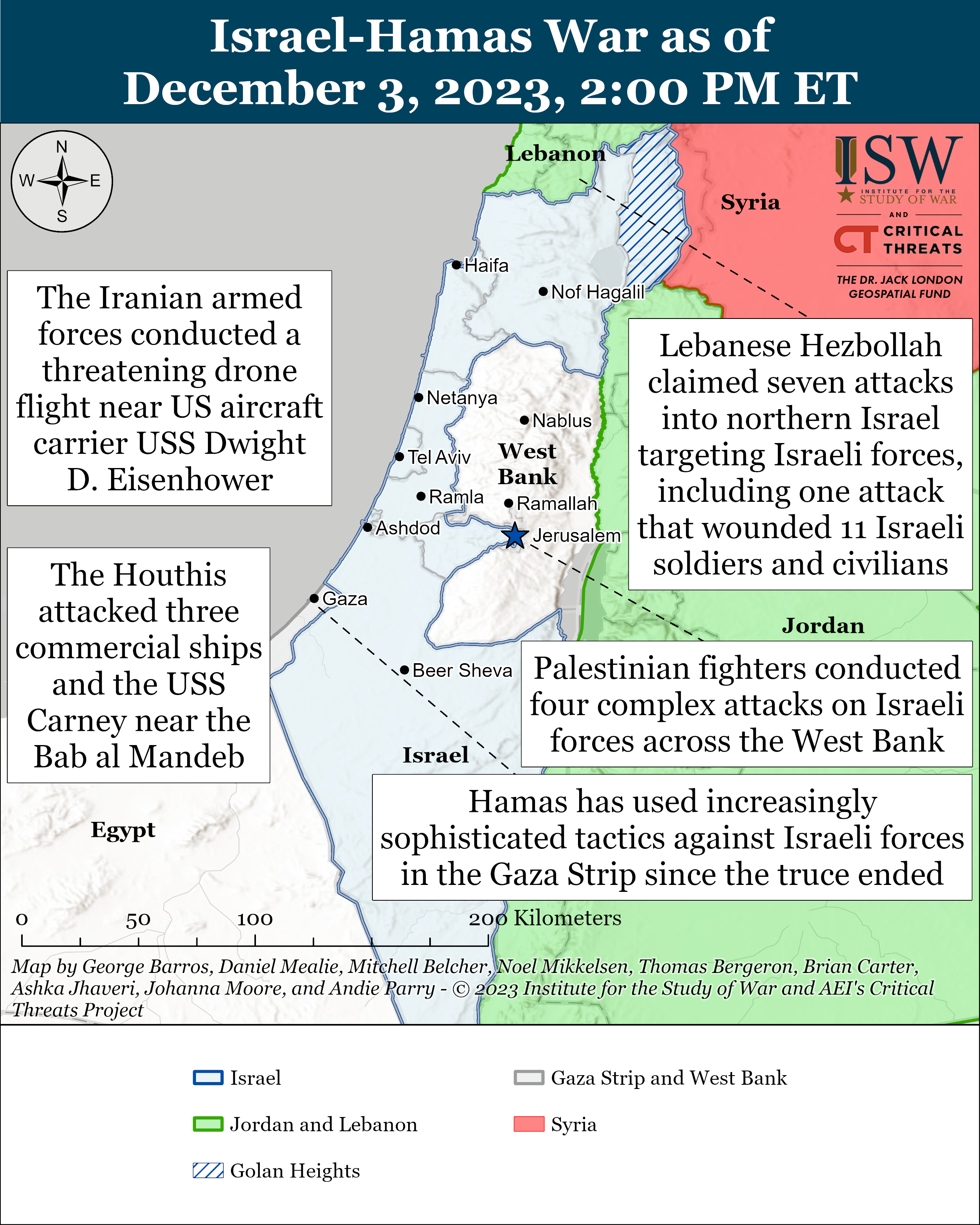
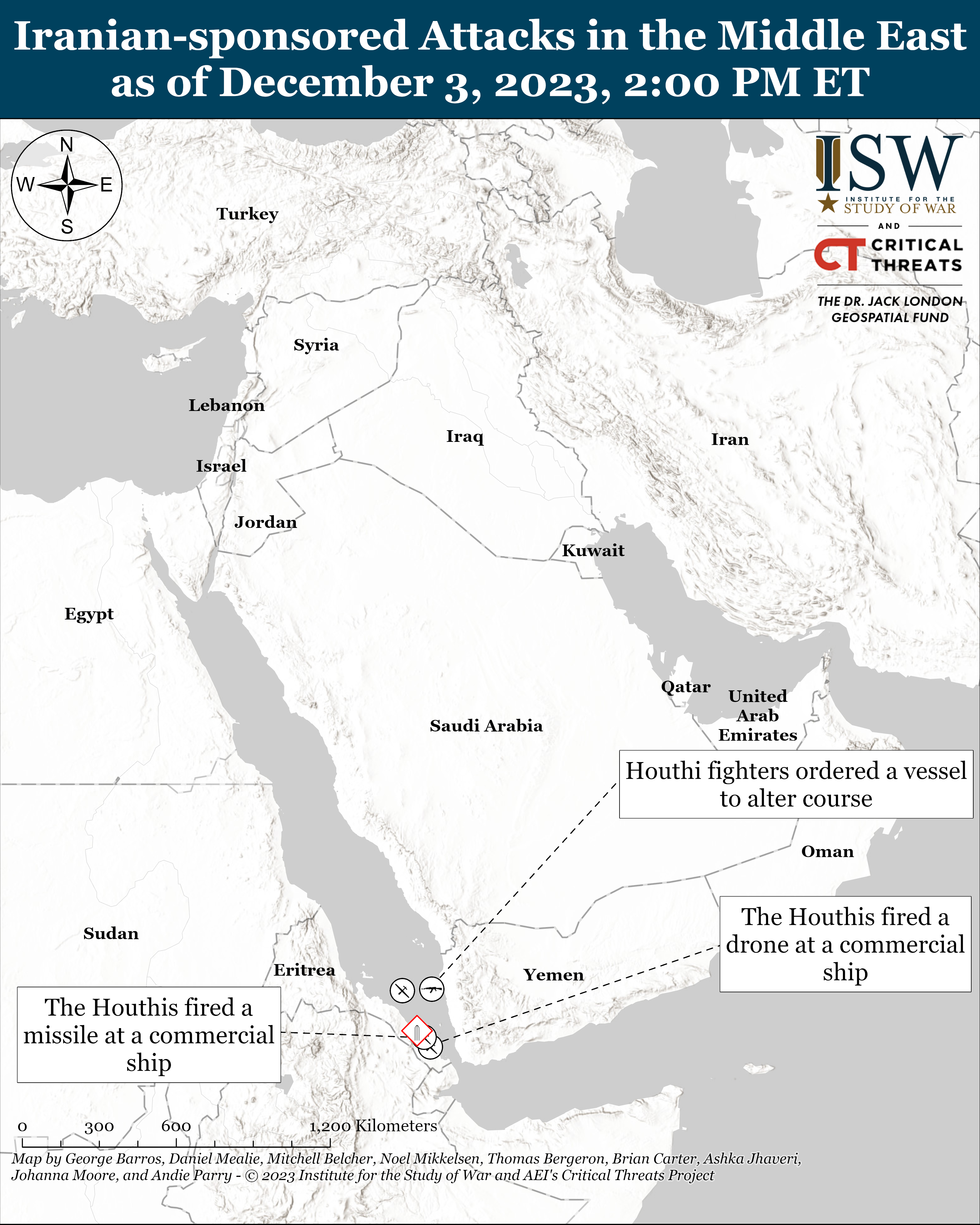
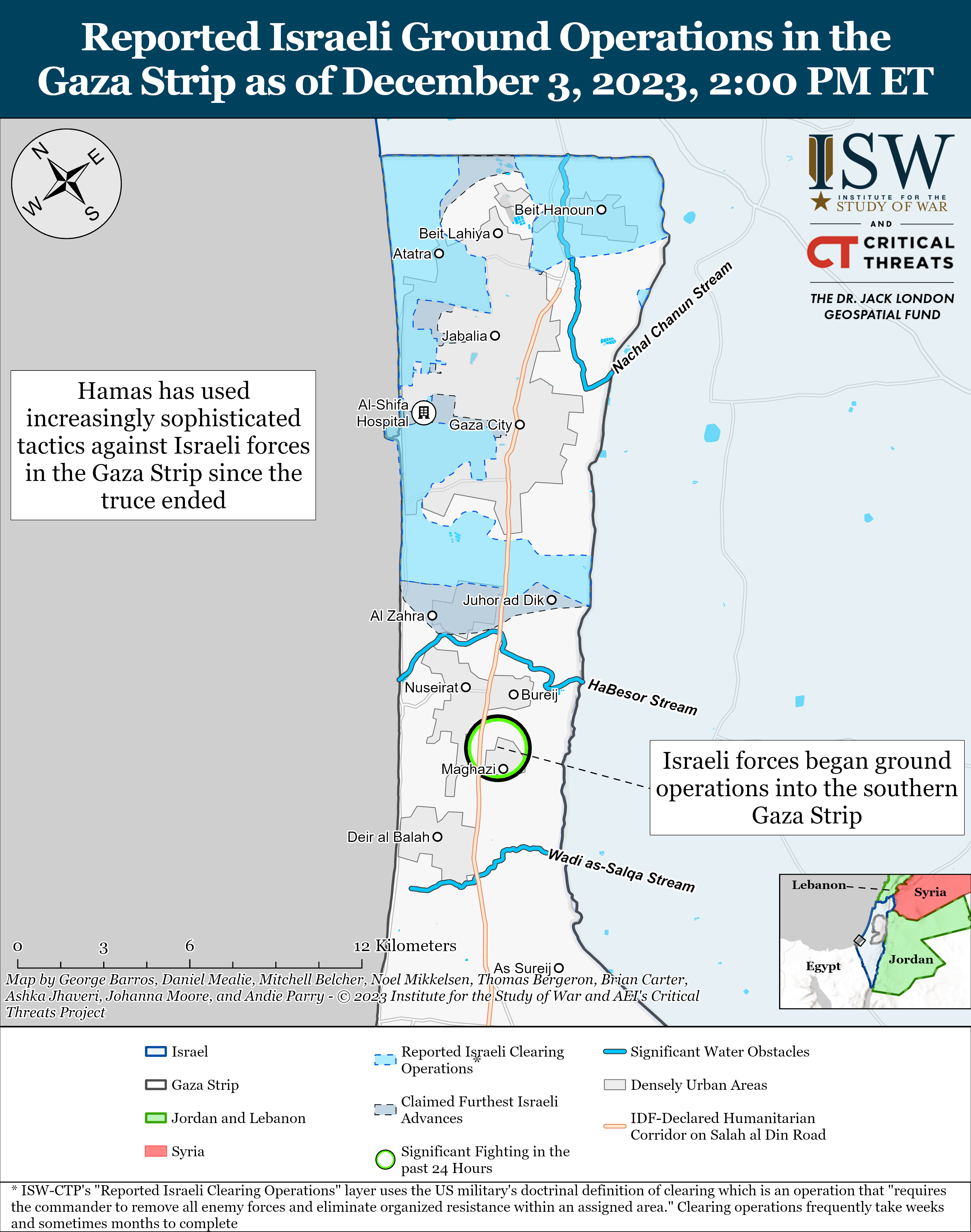
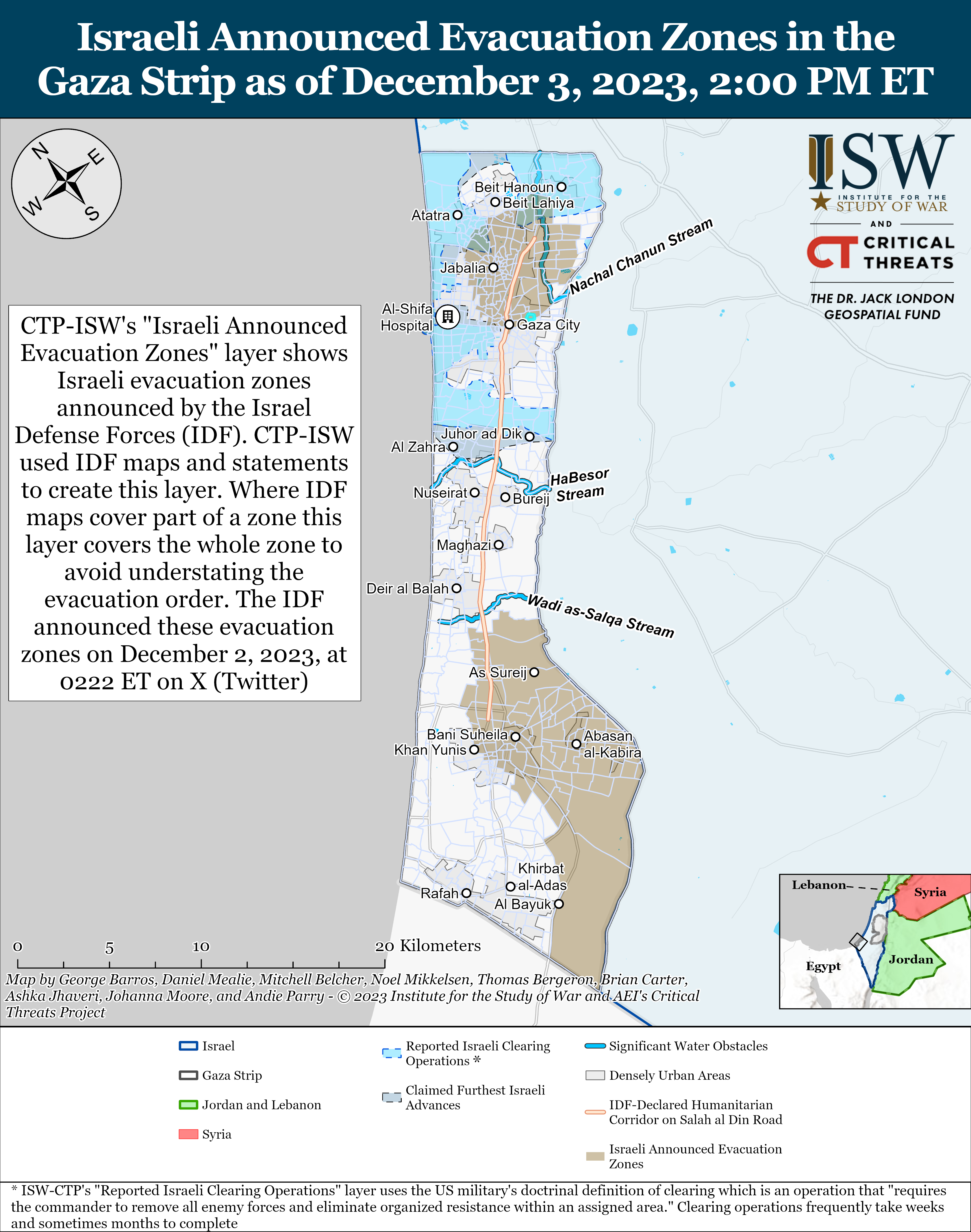
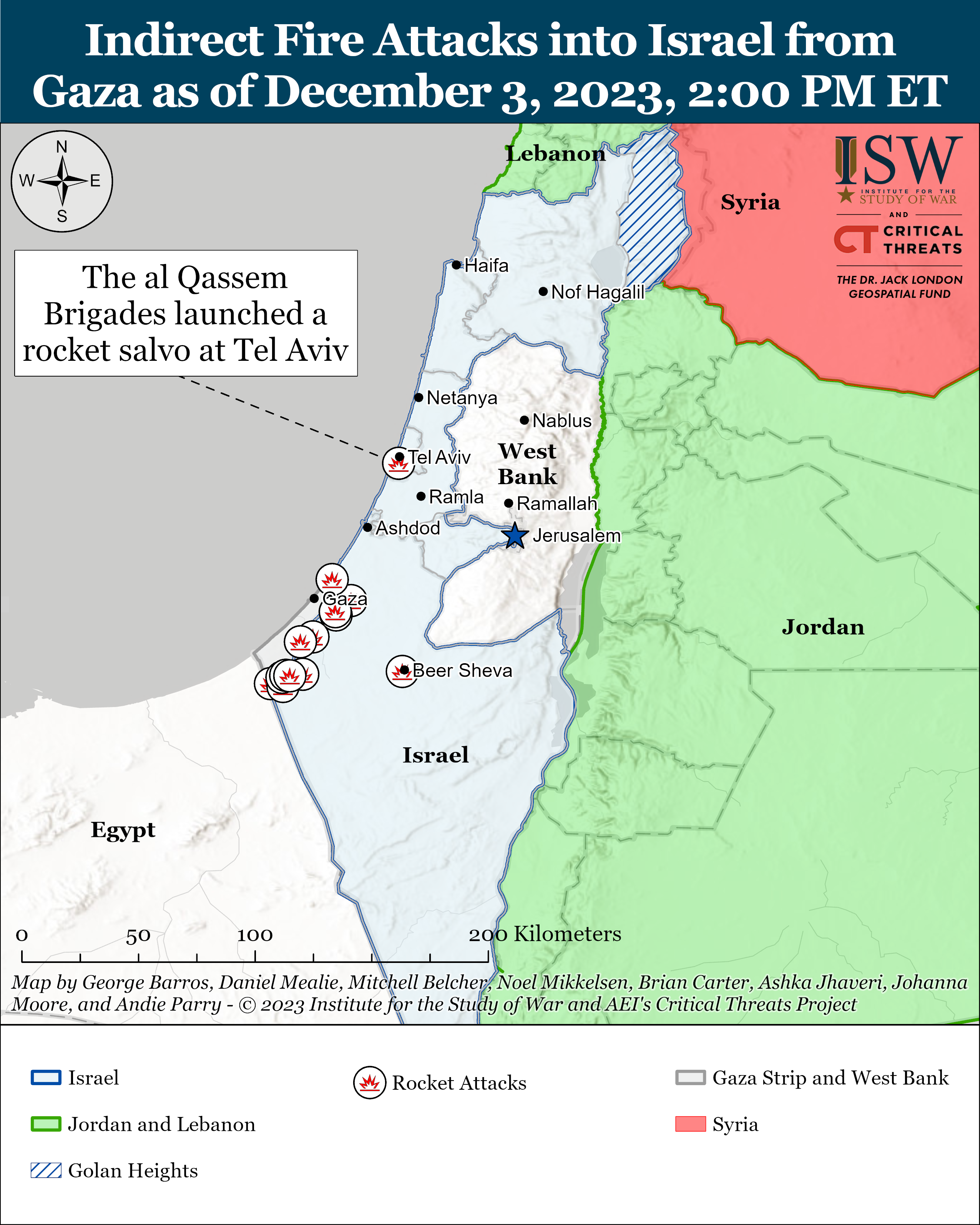
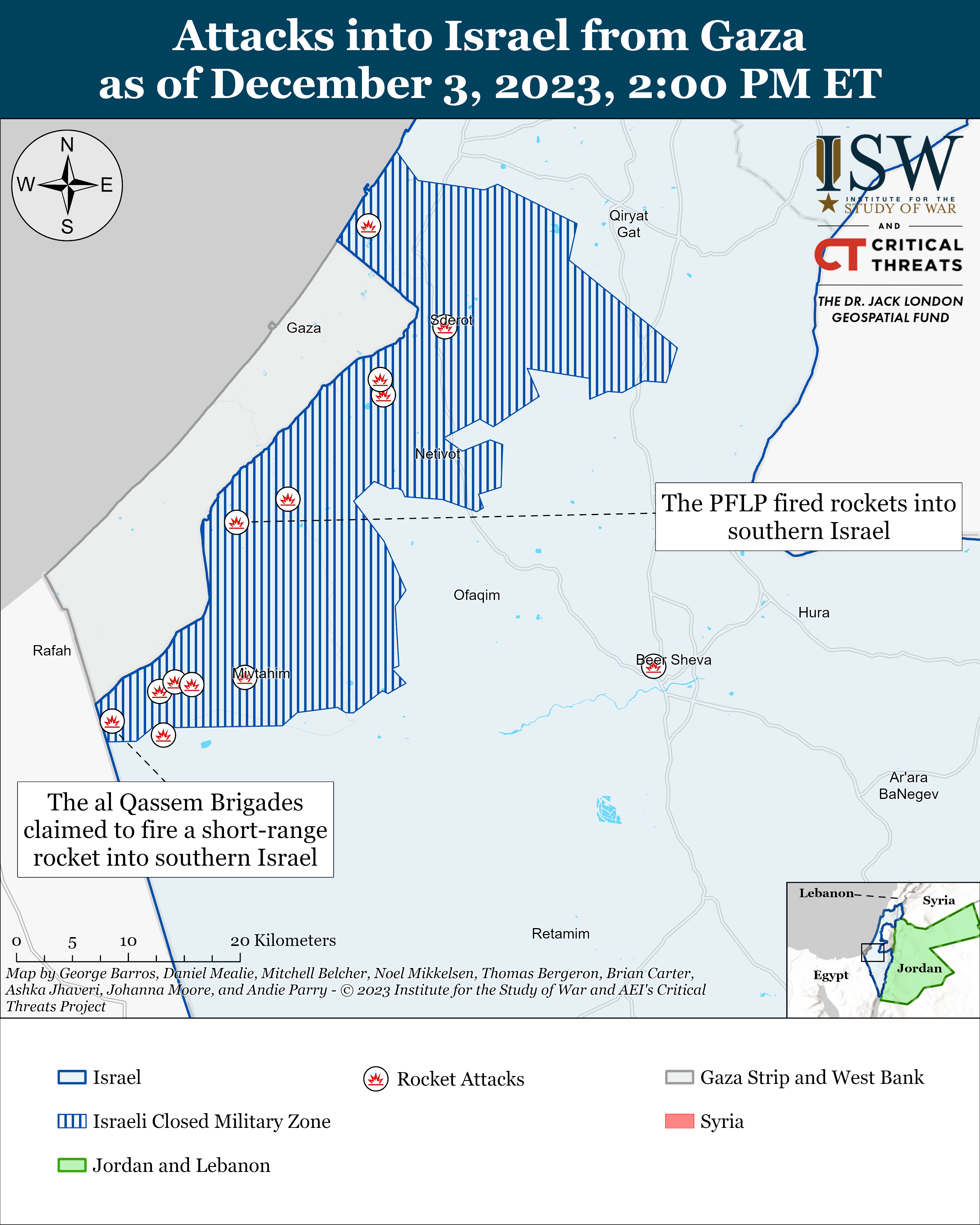
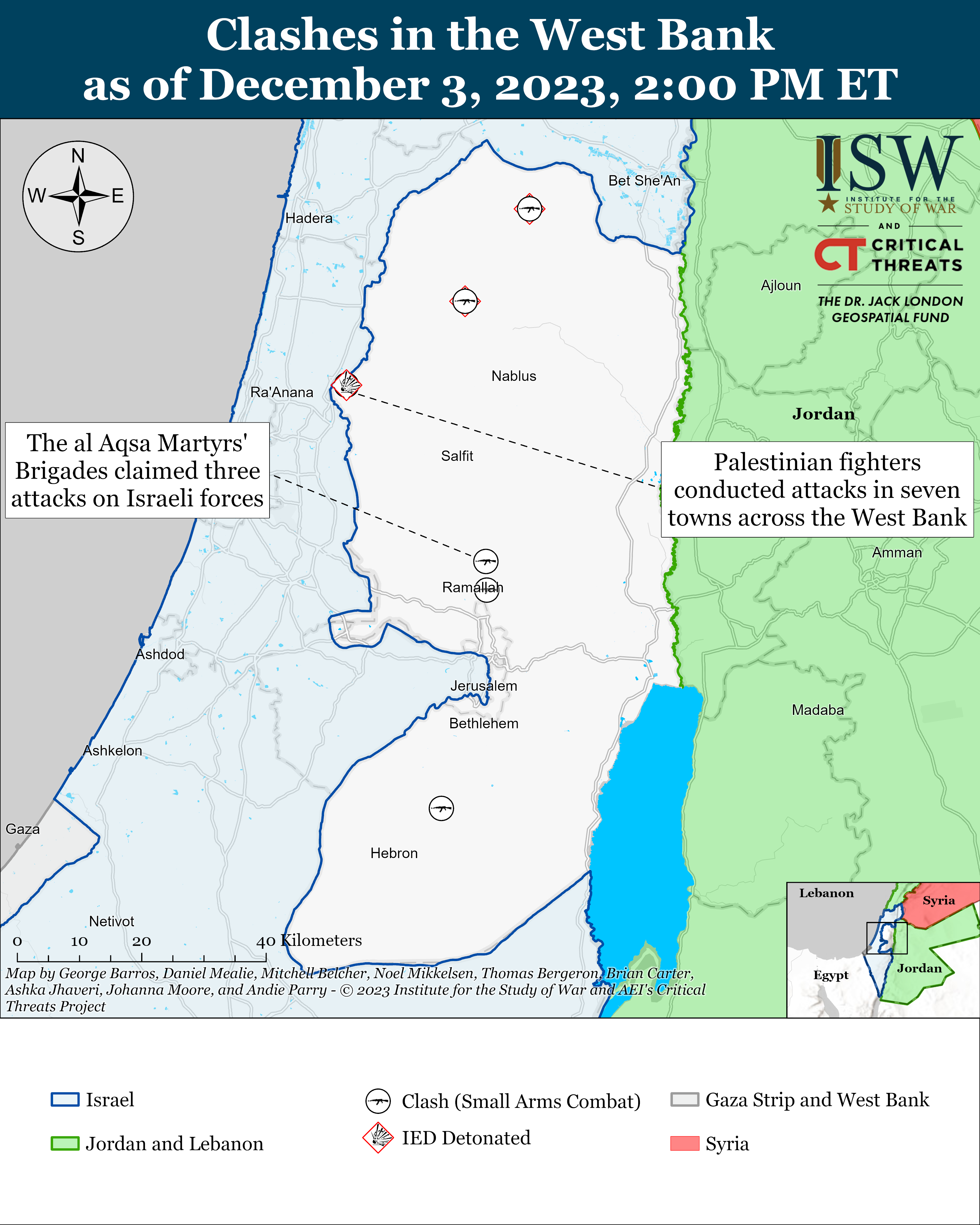
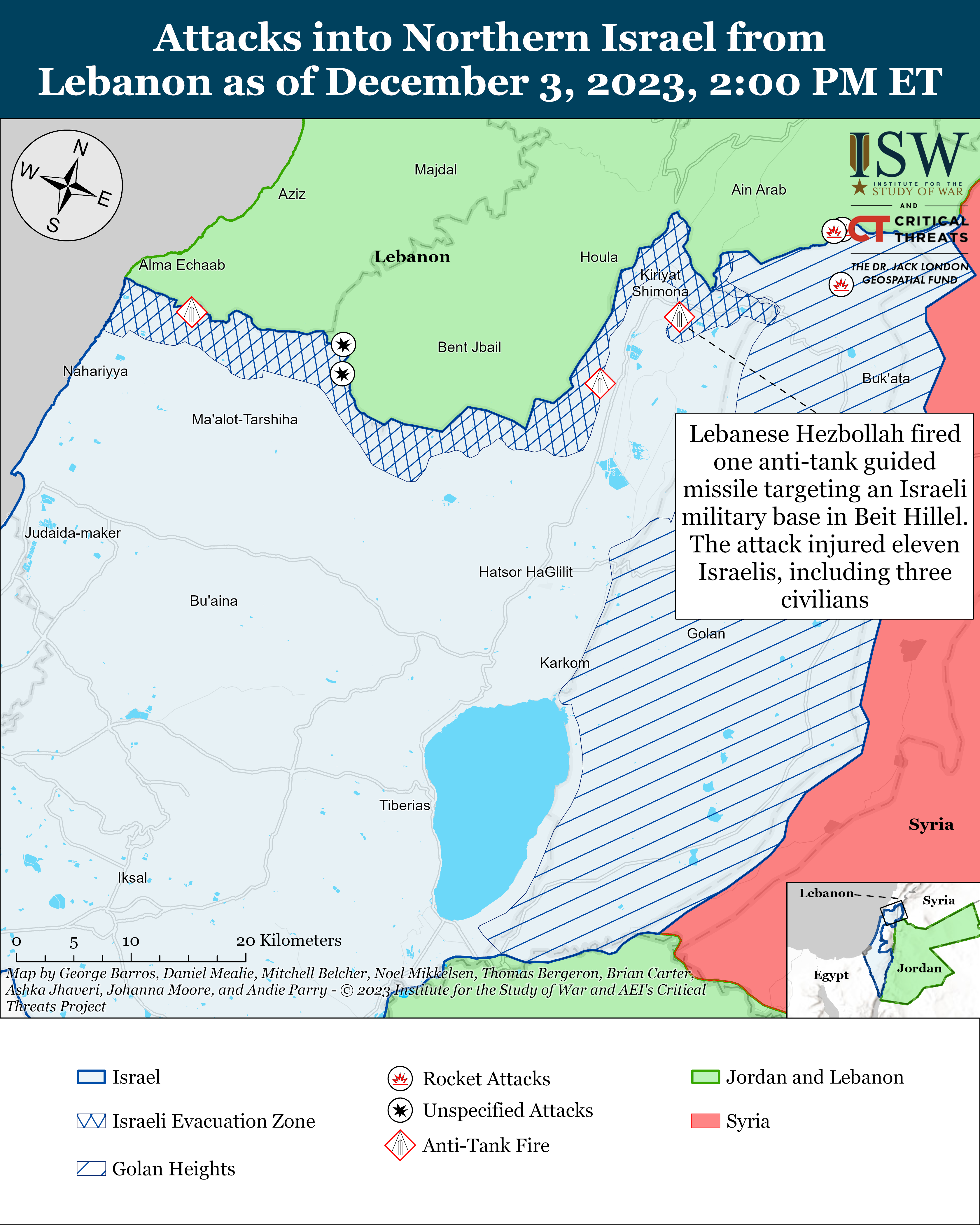
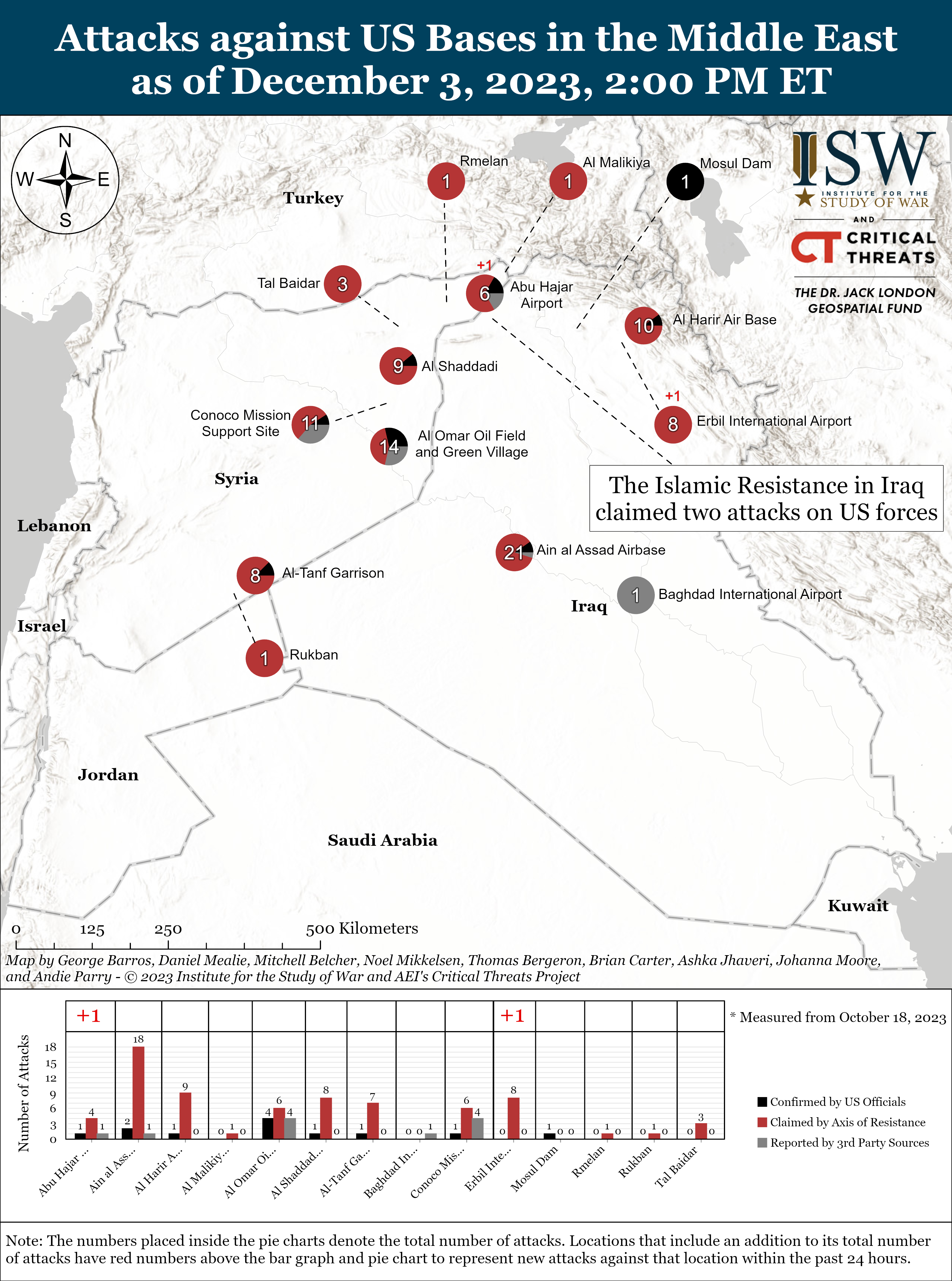
No comments:
Post a Comment